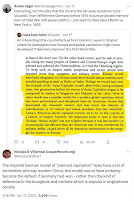Is it just me or has competitive green industrial policy spawned meta-competition over how to best typologize said policies? Ive read 3 in the past 24 hours😮 If so, may the most granular, exhaustive, materially grounded and conjuncturally astute 2x2 matrix emerge victorious 🏆
— Thea Riofrancos (@triofrancos) June 17, 2023
More comedy
‘One senior European official quipped that big German industry was “decoupling from the government” on China.’
— Helen Thompson POLIS (@HelenHet20) June 19, 2023
Part of the future will be whether Washington-led state de-risking can prevail over corporate decoupling from western governments. 1/2.https://t.co/9Lh2yCHMEz
"They were more ‘parliamentarian’, yes. But that’s anything but more democratic! The idea of 1914 as a contest of democracies vs. autocracies is one of the wildest ways in which the Anglos have gaslit our sense of history"
"It's held that GER was *uniquely* authoritarian, militantly nationalist, chauvinistic, antisemitic. One glance at France, Austria shows this to false. E.g.: Dreyfus Affair would not have happened in GER, and it was there you find the most active women's- and labour movements etc."
This book is not designed to cover a section of history. It is designed rather, to provide answers to a definite set of historical questions arising out of the "German problem." The questions are these: Did the Germans‘ failure to achieve, under their own power, a liberal democracy in the western sense mean simply the triumph of conservatism over generic liberalism in Germany or was a peculiar German attitude toward liberty involved in its defeat? If there was such an attitude, what were its ingredients? And finally, given the ingredients at a special German approach to the problems of political freedom, how did that strange historical development work which kept changing the conditions while leaving the ingredients themselves constant?
The first of these questions, on which the others hinge, is easily decided. Without minimizing in the slightest the conservative weight of German authoritarian institutions or the bitterness of the liberal opposition to them during the 19th century, an historical view into any period of modern German history must still acknowledge that the external posture of German liberalism has ever been qualified by its distinctive internal structure. The juxtaposition—indeed, even the connection—of one conception of liberty that could be realized only within the authoritarian state and of another that could be realized only in an absolute realm beyond all states is a commonly remarked German phenomenon. It has been traced back to Luther and up to Hitler. My problem is to show what the connection between these two apparently antithetical conceptions has been and how it has grown.
And there we go. The future of freedom is Millian, existing only in the context of *benign* authority.
And supporters of that authority will decide when it applies and when it doesn't. Leusder supports Ben Judah and his celebration of a new Europe, while both support a state founded in conquest and separatism. Palestinian citizens of Israel will never have full equality in a Jewish state. That's the point.


No comments:
Post a Comment
Comment moderation is enabled.